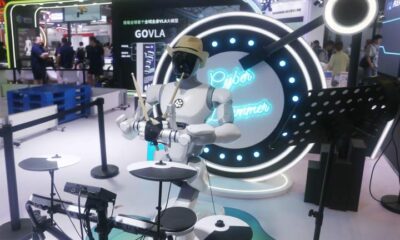Science
Exploring AI Music: Innovation Meets Limitations for Artists

The rise of AI-generated music is reshaping the music industry, presenting both opportunities and challenges for artists. While some AI artists have gained popularity, questions about the depth and authenticity of their sound remain. Musicians are increasingly examining the impact of artificial intelligence on creativity and the limitations of these technologies.
Understanding AI’s Role in Music Production
AI music has been characterized by a blend of efficiency and creativity, yet many argue that the results often lack substance. According to a report by Billboard, AI-generated artists are appearing regularly and achieving commercial success. However, a closer look reveals that many of these creations are produced by human musicians who utilize AI tools to enhance their work.
The question arises: how many AI artists truly reflect diverse backgrounds, particularly when it comes to representation? Notably, artists like Xania Monet and Unbound Music are making strides in capturing a core sound. While their acoustic mixes provide a decent auditory experience, critics point out that the music often feels formulaic and shallow.
The essence of creativity, many argue, lies in the hands of human musicians. AI can assist with mixing and arranging but lacks the ability to innovate independently. Musicians bring unique perspectives and emotional depth to their compositions, qualities that AI cannot replicate.
Challenges and Opportunities in AI Music
The limitations of AI in music production highlight a fundamental truth: technology cannot replace the human element in creativity. Artificial intelligence models are driven by algorithms and data, resulting in outputs that may lack originality. While they can produce music quickly, the absence of genuine inspiration raises concerns about the future of artistic expression.
The music industry has witnessed its fair share of forgettable tracks, regardless of whether they are created by humans or AI. As noted, the mix of uninspired artists and generic arrangements is not confined to technology. The long-standing issue of mediocrity in music persists, regardless of the tools used.
Recording music involves a complex process of trial and error. Musicians often grapple with self-doubt, questioning their creative choices. As legendary musician Paul McCartney once suggested, the process involves experimentation, where ideas can evolve into something extraordinary. This capacity for exploration and innovation is where human musicians excel, using AI as a helpful tool rather than a replacement.
AI can serve as a catalyst for creativity, offering musicians new ways to experiment and develop their sound. The potential for collaboration between human artists and AI is vast, provided that the technology is viewed as a complement rather than a competitor.
As the landscape of music continues to evolve, the conversation surrounding AI’s role is critical. Musicians must navigate this new terrain while ensuring that their artistry remains at the forefront. Embracing AI’s capabilities without losing the essence of what makes music relatable is the key to unlocking a future where technology and creativity coexist harmoniously.
-

 World4 months ago
World4 months agoScientists Unearth Ancient Antarctic Ice to Unlock Climate Secrets
-

 Entertainment4 months ago
Entertainment4 months agoTrump and McCormick to Announce $70 Billion Energy Investments
-

 Lifestyle4 months ago
Lifestyle4 months agoTransLink Launches Food Truck Program to Boost Revenue in Vancouver
-

 Science4 months ago
Science4 months agoFour Astronauts Return to Earth After International Space Station Mission
-

 Technology2 months ago
Technology2 months agoApple Notes Enhances Functionality with Markdown Support in macOS 26
-

 Top Stories3 weeks ago
Top Stories3 weeks agoUrgent Update: Fatal Crash on Highway 99 Claims Life of Pitt Meadows Man
-

 Sports4 months ago
Sports4 months agoSearch Underway for Missing Hunter Amid Hokkaido Bear Emergency
-

 Politics3 months ago
Politics3 months agoUkrainian Tennis Star Elina Svitolina Faces Death Threats Online
-

 Politics4 months ago
Politics4 months agoCarney Engages First Nations Leaders at Development Law Summit
-

 Technology4 months ago
Technology4 months agoFrosthaven Launches Early Access on July 31, 2025
-

 Top Stories1 week ago
Top Stories1 week agoFamily Remembers Beverley Rowbotham 25 Years After Murder
-

 Entertainment4 months ago
Entertainment4 months agoCalgary Theatre Troupe Revives Magic at Winnipeg Fringe Festival













